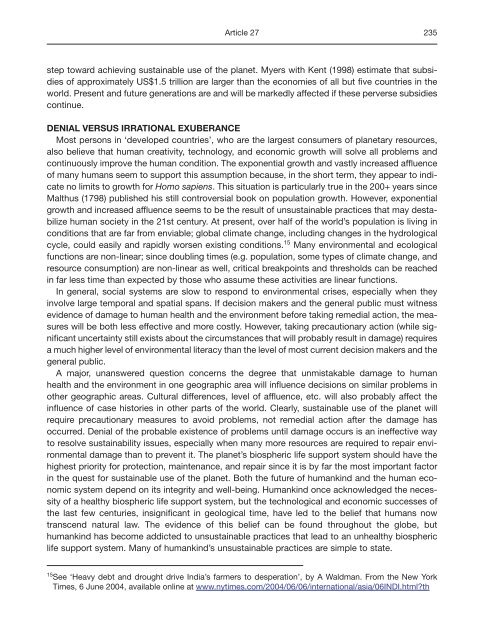View - ResearchGate
View - ResearchGate
View - ResearchGate
You also want an ePaper? Increase the reach of your titles
YUMPU automatically turns print PDFs into web optimized ePapers that Google loves.
Article 27235step toward achieving sustainable use of the planet. Myers with Kent (1998) estimate that subsidiesof approximately US$1.5 trillion are larger than the economies of all but five countries in theworld. Present and future generations are and will be markedly affected if these perverse subsidiescontinue.DENIAL VERSUS IRRATIONAL EXUBERANCEMost persons in ‘developed countries’, who are the largest consumers of planetary resources,also believe that human creativity, technology, and economic growth will solve all problems andcontinuously improve the human condition. The exponential growth and vastly increased affluenceof many humans seem to support this assumption because, in the short term, they appear to indicateno limits to growth for Homo sapiens. This situation is particularly true in the 200+ years sinceMalthus (1798) published his still controversial book on population growth. However, exponentialgrowth and increased affluence seems to be the result of unsustainable practices that may destabilizehuman society in the 21st century. At present, over half of the world’s population is living inconditions that are far from enviable; global climate change, including changes in the hydrologicalcycle, could easily and rapidly worsen existing conditions. 15 Many environmental and ecologicalfunctions are non-linear; since doubling times (e.g. population, some types of climate change, andresource consumption) are non-linear as well, critical breakpoints and thresholds can be reachedin far less time than expected by those who assume these activities are linear functions.In general, social systems are slow to respond to environmental crises, especially when theyinvolve large temporal and spatial spans. If decision makers and the general public must witnessevidence of damage to human health and the environment before taking remedial action, the measureswill be both less effective and more costly. However, taking precautionary action (while significantuncertainty still exists about the circumstances that will probably result in damage) requiresa much higher level of environmental literacy than the level of most current decision makers and thegeneral public.A major, unanswered question concerns the degree that unmistakable damage to humanhealth and the environment in one geographic area will influence decisions on similar problems inother geographic areas. Cultural differences, level of affluence, etc. will also probably affect theinfluence of case histories in other parts of the world. Clearly, sustainable use of the planet willrequire precautionary measures to avoid problems, not remedial action after the damage hasoccurred. Denial of the probable existence of problems until damage occurs is an ineffective wayto resolve sustainability issues, especially when many more resources are required to repair environmentaldamage than to prevent it. The planet’s biospheric life support system should have thehighest priority for protection, maintenance, and repair since it is by far the most important factorin the quest for sustainable use of the planet. Both the future of humankind and the human economicsystem depend on its integrity and well-being. Humankind once acknowledged the necessityof a healthy biospheric life support system, but the technological and economic successes ofthe last few centuries, insignificant in geological time, have led to the belief that humans nowtranscend natural law. The evidence of this belief can be found throughout the globe, buthumankind has become addicted to unsustainable practices that lead to an unhealthy biosphericlife support system. Many of humankind’s unsustainable practices are simple to state.15 See ‘Heavy debt and drought drive India’s farmers to desperation’, by A Waldman. From the New YorkTimes, 6 June 2004, available online at www.nytimes.com/2004/06/06/international/asia/06INDI.html?th















